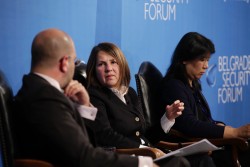OPPORTUNITIES AND OBSTACLES ON THE NEW SILK ROAD
Session Europe and the New Silk Road: Opportunities at Home and Beyond began with Damjan Krnjević Mišković explaining the concept of the New Silk Road and Belt and Road Initiative (BRI) and the history of their inception. The introduction highlighted the grand ambitions of the project as it would in one way or another include half of the population of the world and also half of the global GDP.
 The introduction also touched on the capability of the projects to fundamentally transform the economies of the Western Balkan countries.
The introduction also touched on the capability of the projects to fundamentally transform the economies of the Western Balkan countries.
Cameron Munter discussed the inception of the New Silk Road, the rapid growth in the conceptualization of the project and the potential challenges which have arisen as a result. Mr. Munter pointed out that the New Silk Road began as a modest project which grew and became much more ambitious and as a result it has become such an enormous vision that now those involved are trying to catch up to this quick growth in order to live up to the vision. This project was compared to the Marshall Plan however, Mr. Munter cautioned that “the devil is in the implementation” specifically that the logistics of setting up the New Silk Road require a significant portion the project to be set up in very unstable places. As a result, it is important to keep in mind that the ambitions of this project have been put on the shoulders of countries that have weak governments that may be unable to fulfil the needs of such an ambitious project.
Zhang Qi discussed the motivations of China in regards to this project and the core objectives that have been set by China. It was highlighted that the motivations of China when it comes to this project are from both a domestic and global perspective as the core objective for china is to create and share opportunities for global prosperity. In the same vein, as an emerging economy, China tries to provide public goods for mutually beneficial development of the world. Lastly, Ms. Qi listed the following as the most prominent features of the initiative: The creation by China of an open and inclusive cooperation between various areas and participants as all countries which are interested are welcomed to the project; the creation of new cooperation mechanisms as China would like to establish regional cooperation mechanisms; and China now has the willingness and capability to make contributions to such a project and as a result they wish to share their capabilities and opportunities for development.
 Jasna Plevnik discussed the positive aspects encompassed in these projects. One of the most positive factors of the project is that it is financial rather than political and aims to achieve cooperation through economic growth. The BRI is an important project which would allow for a significant portion of the world to stay globally connected and interdependent. It is also important to keep in mind that China’s contribution to the global economic order is certain.
Jasna Plevnik discussed the positive aspects encompassed in these projects. One of the most positive factors of the project is that it is financial rather than political and aims to achieve cooperation through economic growth. The BRI is an important project which would allow for a significant portion of the world to stay globally connected and interdependent. It is also important to keep in mind that China’s contribution to the global economic order is certain.
Ms. Plevnik recommended that the US and EU should support China’s work at home as a hostile environment to free trade and economic integration would make it difficult for it to achieve economic rebalancing. Lastly, this project would allow for great changes in the region to occur as the Western Balkan countries would make a strategy to connect themselves as opposed to competing amongst each other. As a result the BRI would bring about further integration of the region.








